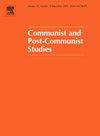金正恩时代的“竞争性寻租”
IF 1.3
4区 社会学
Q3 INTERNATIONAL RELATIONS
引用次数: 0
摘要
本文提出了“竞争性寻租模型”,该模型解释了改革政策如何为“威权转型经济体”的可持续经济增长铺平道路,尽管腐败现象普遍存在。竞争性寻租是指曾经被少数既得利益者垄断的产生租金的经济活动的进入门槛降低,从而吸引更多潜在寻租者进入该系统的过程。这是通过实行权力下放和有利于市场的改革政策实现的,这些政策反过来加剧了腐败,但提高了生产效率,从而改善了社会福利。中国和越南在20世纪80年代的经验就是这种模式的例证。进一步,本文论证了该模型适用于金正恩2014年启动的“经济管理中的社会主义企业责任经营制度”经济改革政策下的朝鲜经济。本文章由计算机程序翻译,如有差异,请以英文原文为准。
“Competitive Rent-Seeking” in the Kim Jong Un Era of North Korea
This article presents the “Competitive Rent-Seeking Model” that accounts for how reform policies paved the way for sustainable economic growth in “authoritarian transition economies” despite widespread corruption. Competitive rent-seeking refers to the process whereby the entry barrier to rent-generating economic activities, once monopolized by a small number of vested interests, has been lowered inviting more potential rent-seekers into the system. This was accomplished by enacting decentralizing and market-friendly reform policies that in turn exacerbated corruption but boosted production efficiency leading to improved social welfare. The model is exemplified by the Chinese and Vietnamese experiences during the 1980s. Furthermore, this article demonstrates that the model is applicable to the North Korean economy under Kim Jong Un’s economic reform policy of the “Socialist System of Responsible Business Operation in Economic Management” initiated in 2014.
求助全文
通过发布文献求助,成功后即可免费获取论文全文。
去求助
来源期刊

Communist and Post-Communist Studies
Multiple-
CiteScore
1.90
自引率
0.00%
发文量
23
期刊介绍:
Communist and Post-Communist Studies is an international journal covering all communist and post-communist states and communist movements, including both their domestic policies and their international relations. It is focused on the analysis of historical as well as current developments in the communist and post-communist world, including ideology, economy and society. It also aims to provide comparative foci on a given subject by inviting comments of a comparative character from scholars specializing in the same subject matter but in different countries.
 求助内容:
求助内容: 应助结果提醒方式:
应助结果提醒方式:


